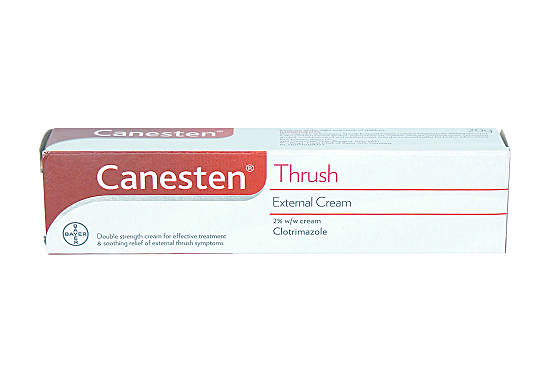Thrush From Antibiotics

Medically reviewed by
Dr Kathryn BasfordLast reviewed: 11 Apr 2019
Can antibiotics cause thrush?

Antibiotics don’t cause thrush infections directly, but the way they work can make thrush infections more likely.
Antibiotics are medications used to treat a bacterial infection. They can kill bacteria or simply stop them multiplying and spreading. Antibiotics don’t just affect the bad, disease-causing, bacteria. They also affect the good bacteria that live naturally in some parts of our body. If good vaginal bacteria are killed, this makes it easier for the fungus that causes thrush (Candida albicans) to grow into an infection.
You might have thrush on antibiotics, if you get the following symptoms during your treatment:
- Itchiness on the vulva (outer parts of the vagina)
- An unusual looking discharge (fluid leaving the vagina)
- Pain during sex
- A stinging sensation or pain when peeing
How can antibiotics cause thrush?
The vagina naturally contains bacteria and yeasts. Most of these never cause any problems, and some even help to maintain the health of the vagina. In particular, one type of bacteria called Lactobacillus is important for keeping the environment of the vagina slightly acidic. Fungi like the ones that cause thrush don’t do as well in acidic environments. So, as long as the level of Lactobacillus is normal, thrush fungi won’t grow to much and thrush infections are less likely to happen.
When you take antibiotics, Lactobacillus and other good bacteria can be killed off or stopped from multiplying. This causes the vagina to become less acidic than normal, which leads to the right conditions for the thrush fungus to grow and multiply. When thrush fungi are able to grow and multiply too easily they can overgrow and lead to a thrush infection and unpleasant thrush symptoms.
from £15.99
from £15.99
from £17.99

No results found.
Please check your spelling or try another treatment name.
Should I avoid antibiotics to prevent thrush?
No, you shouldn’t avoid antibiotics to stop yourself getting thrush. If a doctor has prescribed antibiotic treatment for you then it’s important you complete your full course to make sure your infection goes away and doesn’t come back.
Some bacterial infections can get worse very quickly you don’t use treatment properly and many bacterial infections can have a serious effect on your health. Compared to this, thrush infections are almost always harmless and won’t do any long-term damage.
If you’re worried about getting thrush during your antibiotic treatment, or if you think you’re already having thrush symptoms, talk about it with your GP or the doctor who prescribed the antibiotics for you.
I get recurring thrush, should I use antibiotics?
If you’re given antibiotic treatment by a doctor, you should complete the full course of your medication, even if you get recurrent thrush. Not taking your antibiotics or stopping the treatment before the end of your full course could put your health at risk.
Even if you have thrush regularly, it’s still right for you to take antibiotics for another infection if a doctor has approved them for you. Thrush is usually not harmful and the health risks of not taking antibiotic treatment properly are much higher. You can let your doctor know you have recurrent thrush before or after you’re given antibiotics if you want more advice,
If you regularly get the symptoms of thrush, you should talk about it with your GP or sexual health clinic and check to make sure you don’t have an STI. Once you’re sure you don’t have any STIs, your doctor can help you to check for the possible causes of repeat thrush infection, and help you manage them.
One possible cause of recurrent thrush can be uncontrolled diabetes. Diabetes can cause high blood sugar levels which can help thrush to overgrow. If you’re not sure whether you have diabetes, or you want to check if you current diabetes treatment is working, you can order a home diabetes test kit from ZAVA.
Can you use thrush treatment and antibiotics together?
Yes, sometimes. If you have a chronic thrush infection or you get recurrent thrush, your doctor might suggest that you start thrush treatment at the beginning of, or during the course of your antibiotic treatment.
In most cases, if you are taking antibiotics and start to get thrush symptoms you can use thrush treatments. But, there are some antibiotics that can react with thrush treatments. Always check with a doctor before starting antibiotics and thrush treatment together.
How to avoid thrush while on antibiotics
There are a few simple things that you can do to reduce the risk of getting vaginal thrush during your antibiotic treatment:
- Try some home thrush remedies
- Avoid contact with very hot water, because this can damage your vagina’s natural environment
- Remove wet underwear and bathing suits as soon as possible, because thrush fungus grows well in moist environments
- Wear loose cotton underwear to keep your genital area dry and avoid rubbing
- Wear loose-fitting clothes as well, because tight trousers can increase warmth and moisture around your vulva
- Avoid vaginal deodorants, tampons, and scented pads, because these can cause irritation
- Don’t use a vaginal douche, because this can upset your vagina’s natural environment and cause irritation
- If you have diabetes, check that your sugar levels under control because thrush grows better when your blood sugar levels are too high
Men can also get thrush, but it’s less common in men than women. The medical name for thrush in men is ‘candidal balanitis’. Just like in women, taking antibiotics can make men more likely to get a thrush infection. Advice for avoiding thrush in men while taking antibiotics is similar to advice for women, but in particular:
- keep the penis clean and dry
- avoid irritants, like harsh soaps and deodorants
- talk to a doctor if you get recurrent or chronic thrush infections
- use a condom when having sex with a partner who has thrush

Dr Kathryn Basford is a qualified GP who works as a GP in London, as well as with ZAVA. She graduated from the University of Manchester and completed her GP training through Whipps Cross Hospital in London.
Meet our doctorsLast reviewed: 11 Apr 2019
-
Canesten (2019). Thrush in men. [online] Available at: https://www.canesten.co.uk/intimate-health/learning-zone/thrush-in-men [accessed 25th March 2019].
-
Fiori, A. and Van Dijck, P. (2012). Potent synergistic effect of doxycycline with fluconazole against Candida albicans is mediated by interference with iron homeostasis. Antimicrob Agents Chemother.; 56(7): 3785-96. [online] Available at: https://pubmed.ncbi.nlm.nih.gov/22564841/. [accessed 13th May 2021]
-
NHS Inform (2019). Vaginal thrush. NHS.
-
NHS (2017). Thrush in men and women. [online] Available at: https://www.nhs.uk/conditions/thrush-in-men-and-women/ [accessed 25th March 2019].
-
NHS (2016). Antibiotics interactions. [online] Available at: https://www.nhs.uk/conditions/antibiotics/interactions/ [accessed 25th March 2019].











